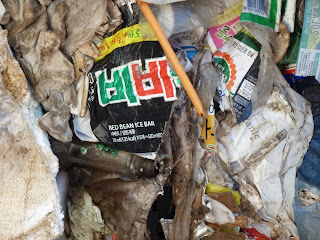Groups speak out for animal welfare, appeal to public not to burst firecrackers

Manila. If animals are able to place infomercials on TV like politicians do, they would have cried to high heavens for a change in the way Filipinos welcome the New Year with a toxic and ear-splitting bang.
The EcoWaste Coalition, a waste and toxic watchdog, stressed this point as it teamed up with the Philippine Animal Welfare Society (PAWS), an organization dedicated to preventing cruelty and ill treatment of animals since 1954, in appealing to the public in run up to New Year not to explode firecrackers.
To drive their message across, the animal rights advocates and the environmental rights advocates today staged a creative event outside the Manila Zoo to show the ill effects of firecrackers not just to the people and environment at large but to hapless animals as well.
Dressed as dogs, birds, and monkeys, youth members of the MASKARA-Green Stage-Filipinas acted out the discomfort, injury and pain that panic-stricken animals, both pet and stray, have to go through every time humans detonate pyrotechnic devices.
"Pets and other animals suffer from stress because of firecrackers. They suffer a lot because their sense of hearing is at least 10 times more sensitive than that of human. Animals also get poisoned when they somehow eat pieces of firecracker wrappings," said Anna Cabrera, Program Director of PAWS.
"Save them from stress and possible poisoning, while saving the environment and your money by not using firecrackers this holiday season," Cabrera emphasized.
According to veterinarians, firecrackers can result to severe ear injuries for animals who have far sharper sense of hearing than humans. Because of their acute hearing ability, the loud noise, which can sound like a bomb to them, can terribly hurt their ears.
“A single explosion of firecracker can put them into panic mode; imagine what a litany of explosions coming from all sides and lasting for hours could do to them,” observed Aileen Lucero, Iwas PapuToxic Campaigner of the EcoWaste Coalition.
“Ultimately, this wasteful and unhealthy practice of lighting up firecrackers of any kind contradicts any noble intention we have in employing them in the first place. Firecrackers drive out animals, not mythological bad luck or bad spirits, and we all know that an ecosystem devoid of fauna stands on the cusp of doom,” Lucero pointed out.
PAWS and the various affiliates of the EcoWaste Coalition are united in urging the public to be sensitive to the health and safety needs of voiceless animals, especially in protecting animals from chemical pollution and excessive noise that cause them to panic and tremble with fear.
“It’s up to us humans to speak for the animals who could not defend themselves from the brutality they experience from firecracker explosions,” the groups declared.
Instead of heralding the New Year with poison fumes and deafening blast from pyrotechnic devices, the groups back the use of safe and environment-friendly substitutes.
The groups recommend the following tips to pet owners to help animals, especially pet dogs, cope with stress and harm associated with the warlike New Year revelry:
1. Appeal to family members and neighbors not to burst firecrackers and be considerate to animals who are unable to protect themselves from toxic harm.
2. Create a safe and comfortable place where your pet can hide from fumes and noises.
3. Observe where your pet goes when she is frightened and give her access to that place such as under the sofa or bed. Let your pet come and go freely to her “comfort zone.”
4. Encourage your pet to engage in an activity that diverts her attention away from startling noises and from behaving fearfully.
5. Refrain from soothing or giving treats to your pet when she is behaving frightfully as she may interpret this as a reward for her anxious behavior.
6. Don’t punish your pet for being terrified of firecrackers as this will only make her more scared.
7. Don’t try to force your dog to experience or be close to her source of fear as this can make her aggressive in her desire to escape from the situation.
8. Keep your gate closed and your perimeter secure to prevent your pet from wandering off due to panic.
In addition, the groups also recommend these additional tips to prevent pets’ exposure to toxins and other hazardous substances that can pose significant health and safety risks, including chemical poisoning, choking, suffocation and damage to vital organs.
1. Keep hazardous materials out of reach of your pet, including plastic bags and wrappings, tobacco products, cleaning solutions, and phosphorous-containing items such as pyrotechnic devices, incense, matches and mosquito coils.
2. Keep common holiday food treats such as chocolate, grapes, macadamia nuts, popcorn, fruit cake, raisin bread and alcoholic beverages, away from your pet as these may cause stomach, kidney and liver ailments as well as choking hazard.




Comments